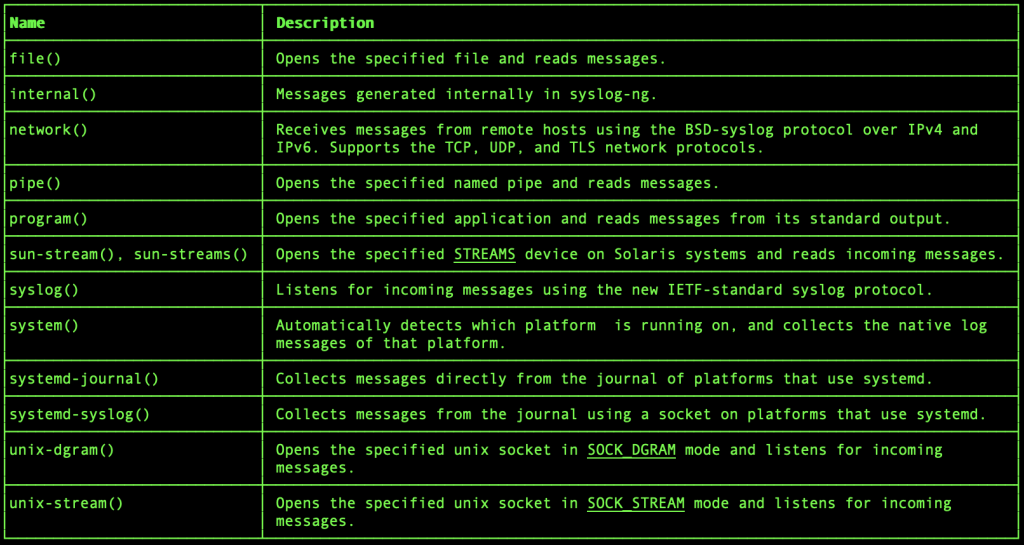

- #DOCKER SYSLOG HOST HOW TO#
- #DOCKER SYSLOG HOST DRIVERS#
- #DOCKER SYSLOG HOST DRIVER#
- #DOCKER SYSLOG HOST WINDOWS#
This source reads platform-specific sources automatically, and reads /dev/kmsg on Linux if the kernel is version 3.5 or newer. Looks like docker is writing duplicate messages to syslog. To begin, SSH into the Docker host as your non-root user. This is covered in Step 2 of the tutorial. Be sure to give your non-root user access to Docker by adding it to the docker group.
#DOCKER SYSLOG HOST HOW TO#
The system() source is in default configuration. In order to configure the log server and make it ready for collecting logs from the Docker hosts, I had to do the following steps: Make sure that Syslog is installed or install it using the commands below: > yum update -y. Docker installed from the official Docker repository, as covered in How To Install and Use Docker on Ubuntu 16.04. Error opening file for reading filename='/proc/kmsg', error='Operation not permitted (1)'

Since syslog-ng doesn't have direct access on the kernel messages, you need to disable (comment) that in its configuration: sed -i 's|file ("/proc/kmsg"|#file ("/proc/kmsg"|g' /etc/syslog-ng/nfġ.
#DOCKER SYSLOG HOST DRIVER#
Error opening file for reading filename='/proc/kmsg', error='Operation not permitted (1)'Įrror initializing source driver source='s_sys', id='s_sys#0' You can fix above error by installing syslog-ng-libdbi package: yum install -y syslog-ng-libdbiĢ. Starting syslog-ng: Plugin module not found in 'module-path' module-path='/lib64/syslog-ng', module='afsql' Plugin module not found in 'module-path' module-path='/lib64/syslog-ng', module='afsql' Using default driver json-file, Docker will create a log file in this path. syslog-address is only needed if you use an external syslog server, which doesn't seem to be your case.

You should find your container logs in that file. Writes log messages to Rapid7 Logentries.1. Using syslog driver, your Docker container will write log data to /var/log/syslog file. Writes log messages to Google Cloud Platform (GCP) Logging.
#DOCKER SYSLOG HOST WINDOWS#
Writes log messages as Event Tracing for Windows (ETW) events. Writes log messages to splunk using the HTTP Event Collector. Writes log messages to Amazon CloudWatch Logs. The fluentd daemon must be running on the host machine. I have a docker container called A that runs on Server B. rebuild the rest of the packages in usr/alpine-linux-extras We don't want to give the exact sequence here as it might change. For each firewall or proxy from which you want to upload logs, create a matching data source. In the Defender for Cloud Apps portal, click the settings icon followed by Log collectors. Go to the Automatic log upload settings page. Writes log messages to fluentd (forward input). rebuild usr/docker-alpine-abuild image reset your hand-edited change, make it use the custom repository again This is important as we need to have the dependencies for future builds. Step 1 Web portal configuration: Define data sources and link them to a log collector. Writes log messages to a Graylog Extended Log Format (GELF) endpoint such as Graylog or Logstash. The journald daemon must be running on the host machine.

NOTE: Be sure to account for disk space requirements for the docker volume created above. sudo docker volume create splunk-sc4s-var. The syslog daemon must be running on the host machine. This will also be used to keep track of the state of syslog-ng between restarts, and in particular the state of the disk buffer. Writes logging messages to the syslog facility.
No logs are available for the container and docker logs does not return any output.See the link to each driver’sĭocumentation for its configurable options, if applicable. Well look at redirecting application logs to the hosts syslog, at redirecting the output of the docker logs command to a single place, and at Googles. For example, -p 8080:80 would expose port 80 from inside the container to be accessible from the hosts IP on port 8080 outside the container.
These parameters are separated by a colon and indicate#DOCKER SYSLOG HOST DRIVERS#
The following logging drivers are supported. Docker images are configured using parameters passed at runtime (such as those above). $ docker inspect -f ' Supported logging drivers


 0 kommentar(er)
0 kommentar(er)
